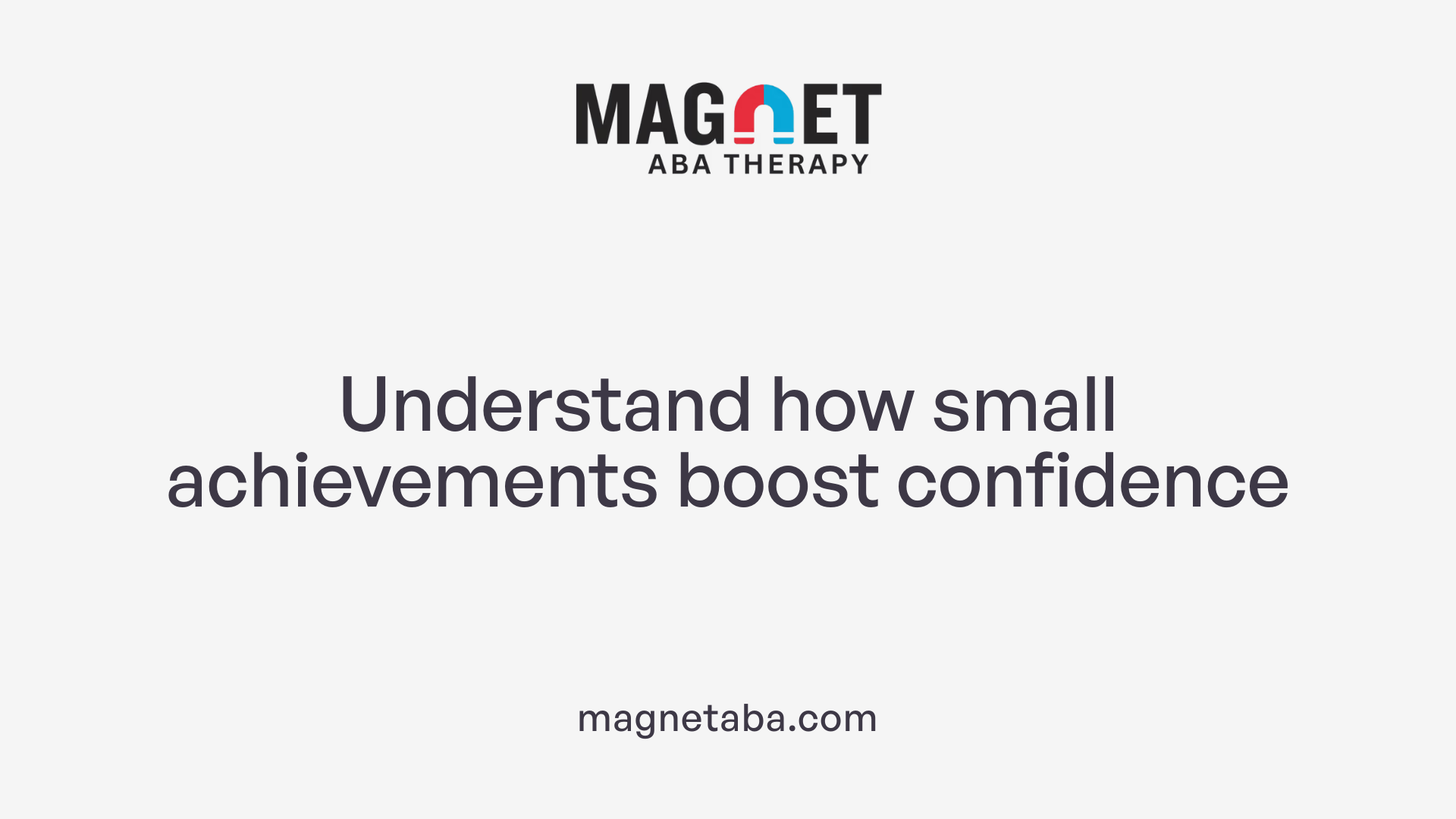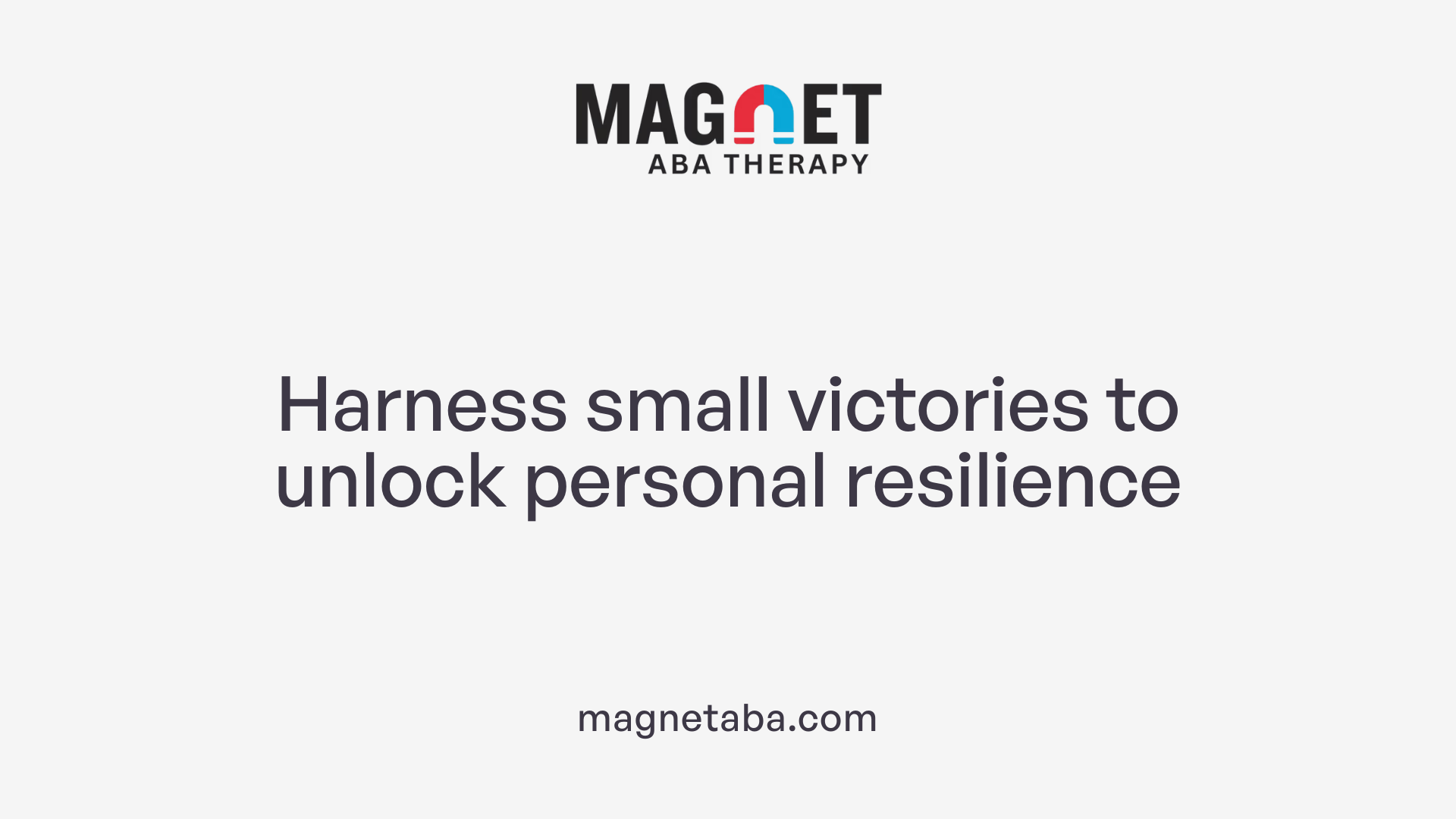Understanding the Significance of Small Wins in Therapy and Recovery
Building confidence in therapy often involves recognizing and celebrating small wins — everyday achievements that may seem minor but carry profound psychological and motivational benefits. This article explores how these incremental successes contribute to mental health recovery, foster resilience, and enhance overall well-being.
The Psychological Foundation of Recognizing Small Achievements

How does celebrating small wins contribute to building confidence in therapy?
Celebrating small wins in therapy significantly boosts confidence by engaging the brain’s reward system. When individuals acknowledge even minor progress, such as managing anxiety symptoms or practicing coping skills, their brain releases dopamine—often called the feel-good hormone. This chemical response enhances mood, motivation, and feelings of success.
Recognizing these achievements creates a sense of momentum, turning abstract goals into tangible steps. It diminishes feelings of being overwhelmed by breaking down larger challenges into manageable pieces. As individuals see their efforts lead to visible results, their belief in their capacity to effect change grows, fostering resilience.
Moreover, celebrating small victories reinforces a positive self-image and encourages persistence. Strategies like tracking wins or sharing successes with trusted people help sustain this motivation. Over time, these small affirmations build a foundation of confidence, making individuals more open to embracing new challenges and sustaining personal development.
Strategies for Therapists to Cultivate Recognition of Small Wins
 Recognizing and celebrating small wins is a powerful technique for therapists aiming to enhance clients’ confidence and promote sustained progress. Implementing practical methods such as journaling, sharing successes, using affirmations, creating visual reminders, and rewarding efforts can make a meaningful difference.
Recognizing and celebrating small wins is a powerful technique for therapists aiming to enhance clients’ confidence and promote sustained progress. Implementing practical methods such as journaling, sharing successes, using affirmations, creating visual reminders, and rewarding efforts can make a meaningful difference.
One effective approach is journaling accomplishments. Clients are encouraged to keep a dedicated 'win journal' where they record every small achievement, whether it’s managing anxiety during a stressful situation or sticking to a new routine. This habit not only fosters awareness of progress but also provides tangible evidence of growth over time.
Sharing victories with trusted friends, family, or within support groups amplifies the feelings of achievement. Celebrations can be as simple as mentioning a success during a therapy session or posting about it online. Social acknowledgment reinforces positive efforts and enhances social bonds, reducing feelings of isolation.
Affirmations are another simple yet effective tool. Therapists can guide clients to develop personalized affirmations that acknowledge their efforts, such as 'I am making progress every day' or 'I am capable of overcoming challenges.' Repeating these affirmations helps rewire inner dialogue, boosting self-esteem.
Creating visual reminders like charts, stickers, or notes displayed around the home or therapy space encourages ongoing recognition. For instance, a visual tracker for mood or behavior changes can show incremental improvements, making progress more visible and motivating continued efforts.
Reward systems further strengthen motivation. Small rewards—such as enjoying a favorite treat or taking a relaxing break—can be tied to achieving specific milestones. These rewards reinforce positive behavior and induce the release of dopamine, a neurotransmitter associated with pleasure and motivation.
Therapists can also help clients develop structured routines like a weekly reflection time or a 'win review' session. During these periods, clients review what they’ve accomplished, set new micro-goals, and celebrate successes. This routine creates consistency and embeds recognition into daily or weekly habits.
By combining these methods, therapists facilitate an environment where clients feel valued and motivated. Recognizing small wins nurtures a growth mindset, reduces overwhelm, and builds resilience. Over time, these practices help clients view setbacks as part of a journey rather than failures, fostering confidence and long-term personal development.
In summary, practical and consistent acknowledgment of even minor achievements—through journaling, sharing, affirmations, visual cues, and rewards—can create a positive feedback loop. This approach not only anchors clients in the present moment but also accelerates their path toward recovery, well-being, and self-efficacy.
The Role of Small Wins in Fostering Resilience and Personal Growth

How does celebrating small successes help improve self-confidence?
Celebrating small successes plays a significant role in boosting self-confidence by making progress tangible and reinforcing positive behaviors. When individuals recognize even minor achievements, such as getting out of bed or completing a task, they activate their brain's reward system by releasing dopamine—a neurotransmitter linked to pleasure and motivation.
This dopamine boost not only elevates mood but also encourages persistence, making it easier to tackle future challenges. Over time, acknowledging these small victories helps create a sense of mastery and progress, fostering a personal growth mindset. This outlook shifts the focus from what remains unfinished to what has been achieved, reinforcing a belief in one's capabilities.
Additionally, recognizing small wins nurtures internal validation. It shifts internal narratives from self-criticism to self-compassion, which is especially beneficial for those dealing with mental health struggles. When people celebrate these achievements, they feel more competent and motivated, which further sustains their efforts and enhances self-esteem.
Practical methods to celebrate small wins include journaling, sharing successes with trusted friends or support groups, affirmations, and creating visual reminders or reward systems. These strategies help embed positive reinforcement into daily routines, making confidence building an ongoing process.
In summary, by acknowledging even minor accomplishments, individuals can significantly improve their self-confidence, create healthier self-perceptions, and develop resilience that supports sustained personal growth.
Creating a Supportive Environment for Celebrating Small Wins

How involving family and support networks can enhance the celebration of small wins
Involving family and close friends in recognizing small achievements can significantly boost motivation and foster a supportive atmosphere. Sharing progress with trusted individuals not only amplifies feelings of accomplishment but also strengthens social bonds. When loved ones acknowledge efforts like attending a therapy session or setting boundaries, it reinforces the person's sense of capability and belonging.
Support networks serve as an encouraging space that normalizes setbacks and celebrates gains, no matter how minor they seem. This collective recognition creates a safe environment where individuals feel understood and motivated to continue their journey. It also offers emotional relief, reducing feelings of loneliness and isolation often linked to mental health struggles.
Practical celebration tools: jars, awards, and themed nights
Using tangible celebration tools can make small wins feel more real and memorable. For example, creating a "win jar" where daily successes are written and collected encourages reflection on progress. Visual reminders, like charts or notes on a wall, serve as constant inspiration and affirmation.
Special themed nights or small award ceremonies can also reinforce positive behaviors. These rituals turn everyday victories into meaningful milestones, making progress feel tangible and rewarding. Acknowledging accomplishments with simple rewards like a favorite snack or a relaxing activity can further motivate ongoing effort.
The importance of recognition and positive feedback
Consistent recognition and positive feedback foster an environment where small successes are valued. When individuals receive genuine praise — whether through verbal affirmations, written notes, or social acknowledgement — it activates the brain's reward system by releasing dopamine. This hormone enhances mood, increases motivation, and encourages repetition of positive behaviors.
Therapists often help clients identify small, meaningful steps during sessions and celebrate them to reinforce progress. Such recognition builds self-esteem and nurtures a growth mindset, which believes that effort in small steps can lead to long-term change. Regular positive feedback emphasizes that every effort, no matter how small, matters.
| Strategies | Examples | Benefits |
|---|---|---|
| Family and Support Network | Sharing progress during family meals or support groups | Boosts social bonds, enhances motivation |
| Celebration Tools | Journals, reward jars, themed nights | Creates tangible reminders of success |
| Recognition and Feedback | Verbal praise, written notes, social acknowledgment | Activates dopamine, reinforces positive behaviors |
How a positive environment encourages ongoing progress
Creating a supportive setting where small wins are regularly celebrated promotes resilience and persistence. It helps individuals view setbacks as part of learning rather than failures. Recognizing incremental progress sustains motivation, especially during slow or invisible phases of recovery.
This environment fosters mindfulness by grounding individuals in their accomplishments and reducing anxiety about broader goals. It also teaches the importance of compassion and patience in the healing process. Over time, such positivity helps develop a self-image centered on capability and growth.
In summary, involving loved ones, utilizing specific celebration tools, and providing consistent recognition collectively create a nurturing atmosphere. This environment energizes individuals to continue their efforts, ultimately nurturing a healthier and more resilient mental state.
Embracing the Power of Small Wins
Incorporating the celebration of small victories into therapy and daily routines can significantly enhance confidence, resilience, and overall mental health. Recognizing incremental achievements makes progress tangible, sustains motivation, and fosters a growth mindset, driving meaningful change. Whether it's through journaling, sharing successes, or creating supportive rituals, acknowledging small wins reinforces positive behaviors and builds a foundation for sustained personal growth. As therapy progresses, these small victories collectively become the building blocks of long-lasting confidence and well-being.
References
- How Celebrating Small Wins Can Boost Your Mental Health
- Celebrating Small Wins: The Power of Progress in Therapy -
- How Celebrating Small Wins Helps Your Mental Health | Rivia Mind
- Self-Esteem Boosters: Celebrating Your Small Wins - owenclinic.net
- Celebrate the Small Wins: A Therapist's Perspective
- Celebrating Small Wins: Tracking Progress Beyond Big Milestones
- Celebrate Small Wins: A Self-Care Strategy for Emotional Wellbeing
- How Celebrating Small Wins Can Boost Mental Well-Being
- Why You Should Celebrate Small Wins











